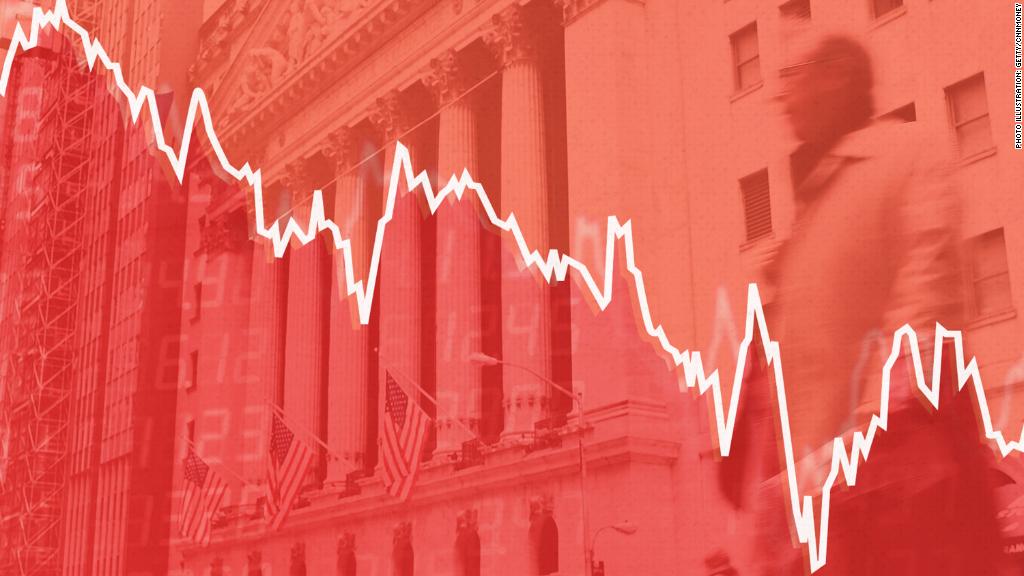
Let's make something perfectly clear. There are no winners in a trade war. That's why global stock markets were nosediving Tuesday.
But as tariff tension between the United States and China escalates there may be some places in the market where investors can hide and ride out the storm.
Investors flocked to US bonds, which are still viewed as some of the most stable assets in the world, despite all the political turmoil. The yield on the benchmark 10-Year Treasury, which moves in the opposite direction of prices, fell Tuesday as investors bought more of Uncle Sam's debt. Yield for other shorter and longer term bonds also dipped Tuesday.
The US dollar also gained ground, but the price of gold fell Tuesday along with the broader market. Many investors view gold as a safe haven, because it's a physical commodity tied to supply and demand -- not the whims of global central banks,
Investors don't need to limit themselves to bonds, commodities and currencies. Experts said there are some stocks that might hold up during the tumultuous times as well.
The dip in US bond yields could make dividend-paying stocks more attractive to investors seeking the security of fixed income.
To that end, Verizon (VZ) -- which pays a dividend that yields 4.9% -- was up nearly 2% Tuesday even as the Dow fell 400 points. Utilities and real estate investment trusts, sectors that also pay big dividends, were holding up well Tuesday too.
The rest of the market wasn't doing so well. But Tom Essaye, founder of investment research firm The Sevens Report, said in his daily market newsletter Tuesday that investors should still focus on companies with a lot of exposure to the US economy.
"If trade wars do escalate, the entire market is going to come under pressure, but even in the "Ugly" scenario, sectors with a domestic US focus should at least relatively outperform the broad market," he wrote.
Related: Trump threatens China with $200 billion more in new tariffs
Regional banks should fare better than multinational banking giants like JPMorgan Chase (JPM) and Citigroup (C), Essaye says. He recommends the SPDR S&P Regional Bank ETF (KRE). Top holdings include Cleveland's KeyCorp (KEY), Memphis-based First Horizon (FHN) and M&T Bank (MTB), which is headquartered in Buffalo.
"Most regional US banks have virtually no overseas exposure, and as such should at least relatively outperform in a trade war environment," Essaye wrote.
Essaye also said that US homebuilders like Toll Brothers (TOL), Lennar (LEN) and Hovnanian (HOV) could hold up better than the overall market too. So could US-focused oil companies in the SPDR S&P Oil & Gas Exploration & Production ETF (XOP).
Smaller US companies, which tend to have less international exposure, could fare well even as fears of a trade war on multiple fronts increase.
That's a key reason why the Russell 2000, an index that focuses on small domestic stocks, actually rose on Monday and was down less than the broader market Tuesday. The Russell 2000 is up 10% this year, while the Dow is now in the red for 2018.
Related: Fed official says trade fears are hurting business optimism
And one analyst even thinks that big tech stocks like Apple (AAPL), Facebook (FB), Amazon (AMZN), Netflix (NFLX) and Google owner Alphabet (GOOGL), which have continued to surge this year, may still be save havens even amidst all the bluster about tariffs and trade wars.
Daniel Ives, head of technology research for GBH Insights, said in a report that the news of an additional $200 billion in tariffs on Chinese goods "is a scary headline that we continue to believe will ultimately will have minimal financial impact to Apple, FANG, and other tech names despite retaliation worries."
Why? Ives argues that Apple is in a good position because of its relationship with Chinese contract manufacturer Foxconn, which builds iPhones for the company. Ives does not think the Chinese government wants to risk hurting Foxconn by punishing Apple.
"Given the tightly woven integration between Apple and Foxconn in China, we believe there is minimal risk to this relationship," Ives wrote.
As for the FANG stocks, Ives thinks that they are "primarily insulated" by any trade war fears, mainly because Facebook, Amazon, Netflix and Google don't have that large of a presence in China. They are more services-oriented than manufacturers.
It's harder to slap a tariff on an ad-dependent social network or streaming media TV service than it is to impose tariffs on cars, planes and food.


